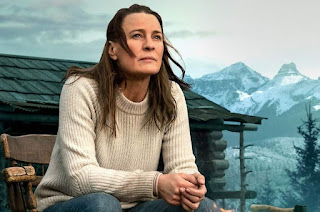Best Quest Films of 2021
A still of Nelly and Marion, portrayed by Joséphine and Gabrielle Sanz, from Céline Sciamma's Petite Maman.
My criteria for choosing these movies is derived from my latest book Cinematic Quests for Identity: The Hero’s Encounter with the Beast (Rowman & Littlefield, 2015). An essential component of my theory about cinematic quests is that heroes do not have a “coming of age” or a “middle-age crisis”—these patriarchal ideas are derived from Western literary tradition and so reflect the experience of men. Cinematic heroes embark on quests many times in their lives in a courageous desire to live a conscious and meaningful existence. They do so at great peril because the quest requires a return to childhood wounds or profound losses; always there is the Beast of individuation, the equivocal figure in the life of the hero that can lead her to madness or to individuation.
This year, there are five outstanding films, four of which are appropriate for adults and children, and some, like Slalom and Little Girl, that are quite topical. All feature a female quest for identity, and with the exception of Little Girl, a documentary, are directed, or written and directed, by women. The order for these entries is random, and does not reflect any effort at ranking.
Petite Maman (subtitled, appropriate for young audiences and adults)
One of the most striking qualities of cinematic quests for identity is the suspension of time. All heroes, even very young protagonists, are compelled, through a current crisis, to revisit a profound loss or an unhealed wound. It is for the purpose of healing that the hero embarks on the path to individuation. For children, as for nine year-old Nelly in Petite Maman, the quest is sometimes an origin story. Céline Sciamma’s sublime film opens shortly after the death of Nelly’s grandmother. Nelly's mother Marion is distraught and rather distant; because of Nelly’s hyper-awareness of her mother’s moods, it appears at the start of the film that the role of mother and daughter are reversed.
In the manner of fairy tales, Sciamma makes that manifest. In probing her mother’s grief, and her own loss, Nelly returns to Marion’s past that hints at a difficult mother-daughter relationship. This of course leads, as all fairy tales do, to a jaunt into the woods, in this case to the forest of Marion's childhood. There Nelly finds a kindred spirit. Like Cocteau’s La Belle et La Bête, and akin to the work of Miyazaki Hayao, who Sciamma credits as an inspiration, Petite Maman is a terrific movie for the girl in all of us, with outstanding performances by twin sisters Joséphine and Gabrielle Sanz.
Land
Perhaps one of the most underrated of American actresses, Robin Wright’s breakthrough performance in State of Grace (1990) should have made her a Hollywood star, and while she went on to a dozen credible performances, mostly in forgettable roles, it is in Land, at age 55, that she again realizes her potential. Wright’s debut feature as a director is about Edee (Wright), a deeply troubled, middle-aged woman who buys a cabin, sight unseen, on a plot of mountain-top wilderness.
Rather improbably, she immediately sells the equally expensive SUV that got her there. The screenplay never recovers from that blunder that suggests Edee is hellbent on suicide, a narrative dead-end. The source of Edee’s wish for isolation is also withheld far too long, and while viewers will guess that she has suffered a profound loss, it is actually an outsized ego that led her to winter in that cabin, sans electricity and running water. Arrogance is rarely an attribute of female heroes in cinematic quests, but Wright’s performance makes it believable. The Beast of Edee’s individuation, the character that propels the hero to destruction or redemption, is Miguel (Demián Bichir), a fellow hermit. He confronts Edee with her penchant for self-absorption that has long kept her from appreciating the beauty that surrounds her.
Slalom (appropriate for adolescents and adults)








